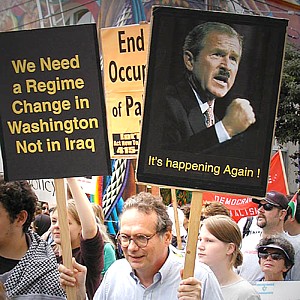Sources (back
to top)
The New York Times (selected articles in chronological order)
I found the New York Times database to be filled with an abundance
of information. The database dates back to 1851 and covers all news articles
up to present day. It allows research by keywords, dates and headlines.
This is a recognized news source, however ideas and views of the individuals
who write the articles can construe the truth to some extent since there
are always going to be personal biases. Most of the articles did not have
authors, which I attribute to either the time when the article was printed,
or the database has not been updated enough to include the authors of
the articles.
- "Roosevelt Death Encourages Nazis," Apr. 14, 1945 pg. 8
- "Hoover Soviet Target," June 23, 1946, pg. 4
- "Russian Vitriolic In Truman Attack," Sept 21, 1947, pg. 9
- "President Called ĎVery Little Maní," May 15, 1947, pg. 18
- "Izvestia Compares U.S. Aim to Hitlerís," March 15, 1947 pg. 4
- "US Reds Declare Truman Aggressor," June 29, 1950, pg. 18
- Wood, Lewis, "Truman Charges Use of The Big Lie For Political Gain,
Sept 18, 1952, pg. 1
- "British Compare McCarthy, Hitler," March 5, 1954 pg. 8
- Wherweins, Austin, "Daley Sees Plot in Vote Recount," Dec. 2, 1960,
pg. 17
- "Kennedy Reviled by Chinese Reds," Sept. 27, 1962, pg.6
- "Pravda Says GOP Offers a Program Like that of the Nazis," July 24,
1964, pg. 11
- Finney, John, "Miller Attacks Big Government," Oct 28, 1964
- Binder, David, "Tito Likens Policy of US to Hitlerís." May 11, 1965,
pg. 5
- Schmemann, Serge, "Germans homage At Moscow Rites," May 6, 1985 pg.A7
- "Castro Criticizes Reagan As He Marks Bay of Pigs," Apr. 21, 1986
- Lazt, Marty "The Hitler Analogy," Jewish News Of Greater Phoenix.
Phoenix, AZ, June 30, 2000. vol. 52, iss. 43; pg. 8
This article was used to compare President Clinton and Hitler, when
Arizona Congressman John Shadegg became upset when the president proclaimed
the Ironwood Forest of Tucson a national monument. This article was
written as an opinion piece in reference to how excessive this comparison
has become in our society. There are no historical facts involved in
the piece, but it gives the reader a valuable insight, by showing the
exaggeration of the comment.
- Tugend, Tom "Controversial Jewish Comic Compares President to
Hitler," Jewish Telegraphic Agency. New York: July 7, 1998.
pg. 12
This article was used to compare President Clinton to Hitler by Jewish
comic Jackie Mason. He talks about how Clinton has no conscience and
would kill as many people as he needs to get where he wants. The comic
never states whether he was serious about the comic or was trying to
make some sort of political point. However this comic tends to write
outrageous things so it can be seen more as a device to get peopleís
attention than to take political stand.
- History News Network, www.hnn.us/articles
This website was a very good resource for finding contemporary articles
and documents relating Hitler to current situation. John Hopkins University
sponsors this website, so I find it to be a credible academic source.
This search engine tags any article that uses references to Hitler whether
political, entertainment, or opinion pieces. The most useful part of
the site is the section called "Hitler Watch" in which current
documents associating any political figure with Hitler are posted. All
political views can be represented on this site.
|
